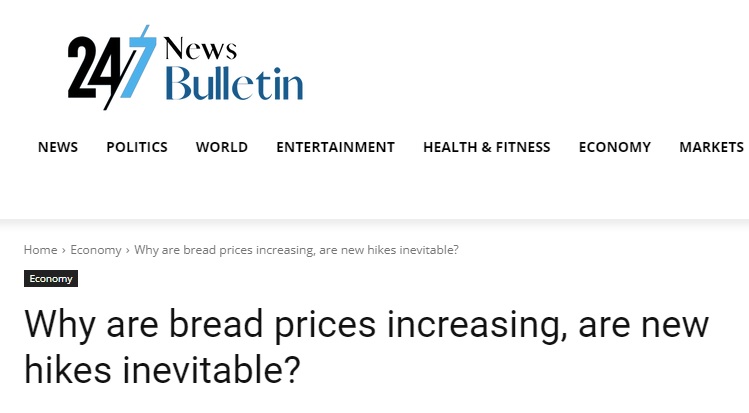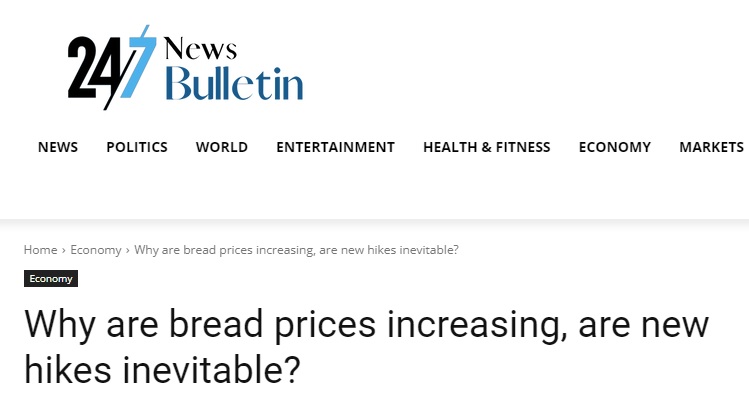247NEWSBULLETİN: WHY ARE BREAD PRİCES İNCREASİNG, ARE NEW HİKES İNEVİTABLE?- 25 KASIM 2021

With the decision taken by the Istanbul Chamber of Commerce (ITO) Assembly on November 11, 230 grams of bread became 2.5 liras in Istanbul. The average price of a 230 gram bread in Turkey is between 2-2.5 liras.
However, according to bread producers, this price does not even cover the cost of bread anymore due to the increase in flour prices.
Cihan Kolivar, Chairman of the Bread Producers Employers’ Union, said that bread will be sold for 4-5 liras, varying from district to district in Istanbul.
Kolivar stated that the furnaces will start to close their shutters in up to 10 days due to high costs.
On the other hand, Istanbul People’s Bread (IHE) increased its packaged products by up to 47 percent, excluding 250 grams of normal bread.
According to the news of DHA, Hasan Demir, Chairman of the Bread Flour and Bakery Products Professional Committee No. 12 of ITO, stated that the bread should be 3 liras.
Halil İbrahim Balcı, President of the Turkish Bakers Federation, said in a written statement that the news that the bread will cost 4-5 TL does not reflect the truth:
“Yes, there is a noticeable increase in the basic inputs of bread. Flour prices, yeast prices, electricity, natural gas and water prices are changing every day.”
“However, this does not mean that we will leave our citizens without bread. Necessary action will be taken to ensure that our consumers are not victimized and our shopkeepers face even greater difficulties.”
increased costs
Bread producers say that since the beginning of 2021, there has been a rapid increase in wheat and flour prices.
According to the Bakery Industry Employers’ Union, flour prices increased by 85 percent in April and November due to “increases in exchange rates, low wheat harvest, and wheat stockpiling of some individuals and institutions”.
BBC TurkishSpeaking to , Çetin Keçeli, President of the Bread Industry Employers’ Union, states that the bakers are in a more difficult situation with the recent hikes:
“The cost of bread used to have a flour cost of 33 percent. However, with the latest flour hikes, this level went up to 48 percent.
“In June, we requested from the ministry to prevent the increase in flour prices as soon as possible. The ministry took a promise from some mills to give flour to bakeries for 195 lira per sack. However, these promises were not kept. Currently, there are flour prices of 280 liras per sack and above.”
“If the mills refuse to give the flour sack at 180-190 liras as they promised and the Turkish Grain Board does not help the bakeries, selling the bread for 2.50 liras will not cover the cost. We will have to switch to a new bread tariff.”
‘A price increase is inevitable’
Union of Chambers of Turkish Engineers and Architects (TMMOB) Chamber of Agricultural Engineers Chairman Baki Remzi Suiçmez, on the other hand, is of the opinion that an increase in the price of bread is “inevitable”:
“There is a serious increase not only in flour, but also in inputs such as water, electricity and natural gas, which should be reflected in the price of bread. If a certain increase is not made, this time we will witness the closure of bakeries and bread queues.”
The increase in bread prices can be made upon the approval of the official application of the chambers of bakers in the provinces by the Governorships.
Speaking to BBC Turkish, agriculture writer Ali Ekber Yıldırım says that bread prices are still under pressure, but that this won’t last long:
“When we started the harvest season, a ton of wheat was 2,500 liras, now it is 4,000 liras. Therefore, flour industrialists increased flour prices accordingly.”
“While the price of a 50-kilogram flour sack was 170-180 liras, it has now increased to 340 liras in some places, in other words, there has been an increase of nearly 100 percent. This increase should somehow be reflected in the bread, but the baker cannot increase the price of bread himself.”
According to Yıldırım, as not only flour but also costs such as rent and energy prices continue to increase, not making a raise in bread will mean the bakers will go bankrupt.
Turkey’s wheat production decreased
While Turkey was a self-sufficient country in wheat production until recently, this picture started to change as of the 2019-2020 season.
One of the main reasons for the price hikes in flour and bread is cited as the significant decrease in Turkey’s wheat production this year.
According to the current Turkish Statistical Institute (TUIK) data, Turkey’s wheat harvest will decrease by 13 percent this year and will be at the level of 17.5 million tons per year.
According to Baki Remzi Suiçmez, Chairman of TMMOB Chamber of Agricultural Engineers, Turkey’s self-sufficiency level in wheat has decreased to 80 percent this year.
Drought is one of the reasons for the decrease in wheat yield.
It is considered that the drought, which is felt throughout Turkey, but affects especially the Eastern Anatolia and Southeastern Anatolia regions in wheat production, has considerably reduced the wheat yield this year.
“Turkey has experienced a very serious drought this year. Turkey, which normally produces 20 million tons of wheat annually, has had to import since this season began,” says Yıldırım.
Stating that the Agricultural Products Office has opened wheat import tenders for the 6th time since June 30, Yıldırım states that wheat prices have increased depending on the exchange rate.
Suiçmez, on the other hand, says that the price of wheat bought from abroad is increasing gradually:
“While buying wheat from abroad for 250 dollars per ton in the first months of 2021, it has now increased to 350-400 dollars, in other words, it has exceeded 4 thousand liras.
“Since we do not provide sufficient support to our own farmers, the farmer withdraws from production, and TMO has to buy from abroad at a higher price and sell it to the domestic market at a lower price.”
Cultivated wheat areas are decreasing
On the other hand, according to official data, the cultivated wheat areas of Turkey are decreasing every year.
Agriculture writer Ali Ekber Yıldırım states that 9 million hectares of wheat planted area has decreased to 6.8 million hectares only in the last 10 years.
According to Çetin Keçeli, President of the Bakery Industry Employers’ Union, wheat production needs to be increased in order for a permanent decrease in flour and bread prices:
“Wheat cultivation is gradually decreasing because the agriculturalists are not getting their money’s worth. We even import wheat now due to the inadequacy of the policies in recent years. Wheat production should be increased by providing incentives to the farmers.”
According to TUIK data, agricultural input costs increased by 27.79 percent on an annual basis as of September.
Evaluating that even this level is quite high, experts state that there has been an increase in agricultural input prices much higher than the data of TUIK.
Baki Remzi Suiçmez, Chairman of the Board of the Chamber of Agricultural Engineers of TMMOB, explains the effect of increasing fertilizer prices on the producers, saying, “In an environment where fertilizers have increased by more than 200 percent, TÜİK explains that the increase in fertilizer prices is 71 percent”:
“Urea, one of the most basic fertilizers of the farmers, has increased continuously due to the natural gas hikes in the world. The price of urea fertilizer, which was 1,800 TL per ton in June 2020, was 4,100 TL in June 2021, 9,000 TL in October, and 11,700 TL at the moment. “
Haber kaynağına ulaşmak için lütfen TIKLAYINIZ.


